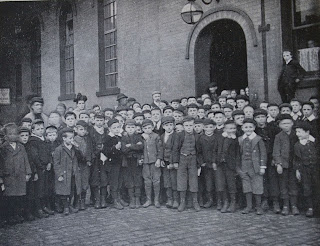Emigration from the workhouses
“The care and training of children are matters which should receive the anxious attention of Guardians. Pauperism is in the blood, and there is no more effectual means of checking its hereditary nature than by doing all in our power to bring up our pauper children in such a manner as to make them God-fearing, useful and healthy members of society.”
- Poor Law Handbook of the Poor Law Officers' Journal (1901)
Many Victorians believed that pauper adults bred pauper children. There was a strong fear around social disorder and the effects of pauperism in England. In 1870 when the charity was founded, Manchester and Salford still accommodated quite a few workhouses in its midst. Although they had improved from the archetypical image of a place of cruelty, hunger and squalor, most people still saw admission as a last resort.
Many of the boys and girls who were admitted to the Refuge in the early days came from one of the local workhouses. Children who ended up in the workhouse were often orphans, destitute or were taken in with another family member, who had become unable to look after themselves. Once admitted, families were separated into different wards and set to hard labour if fit. Children were schooled inside the workhouse.
The parties of children whom were emigrated across to the Marchmont Home by the charity were often made up of children from the various workhouses. Records show that between 1888-1914, for example, around 98 children were emigrated from the Salford Workhouse. The Refuge helped emigrate about 76 of these. Each year the Refuge would write to the Salford Board of Guardians, enquiring whether they had children they wished to emigrate. The charity would then charge the Board £10 per child. This would be used for an outfit (£1, 10 shillings), railway fare (2 shillings, 6 pence), passage money, kit and bedding (£8) and other expenses (7 shillings, 6 pence).
In later years less and less children were emigrated from the workhouses as many poor law guardians disagreed with the process. Most of the institutions were closed around 1930 when the Board of Guardians system was abolished.



Our GGrandfather was in Wolverhampton Workhouse. How would we find out how he left and when he left and ended up in Canada? In 1901 he was 14 years old. William Madden
ReplyDeleteHi - our Archivist is out of the office for a few days, but I'll pass on your question and get her to reply as soon as she's back. Thanks for reading!
DeleteHi,
DeleteIf your Great Grandfather was in the Wolverhampton Workhouse it is likely he was emigrated through the Middlemore Homes in Birmingham. I believe their records are at Birmingham Archives;
http://www.nationalarchives.gov.uk/nra/searches/subjectView.asp?ID=O26369
However if you want to send me an email at enquiries@togethertrust.org.uk with your Great Grandfather's details I can check our database to see if he had any link with us.
Thanks.